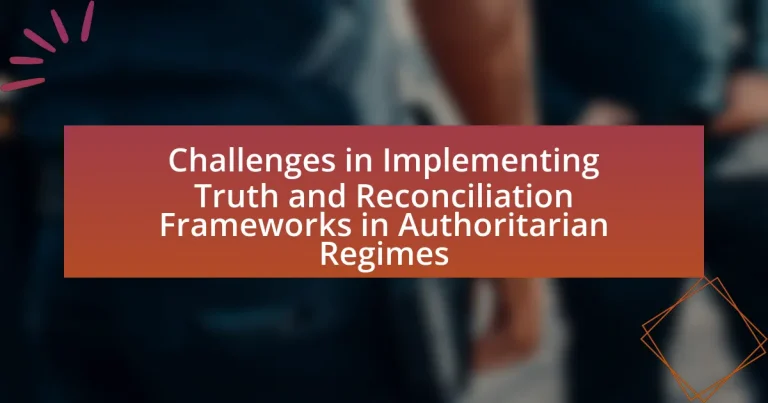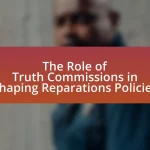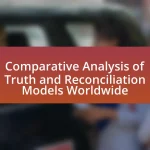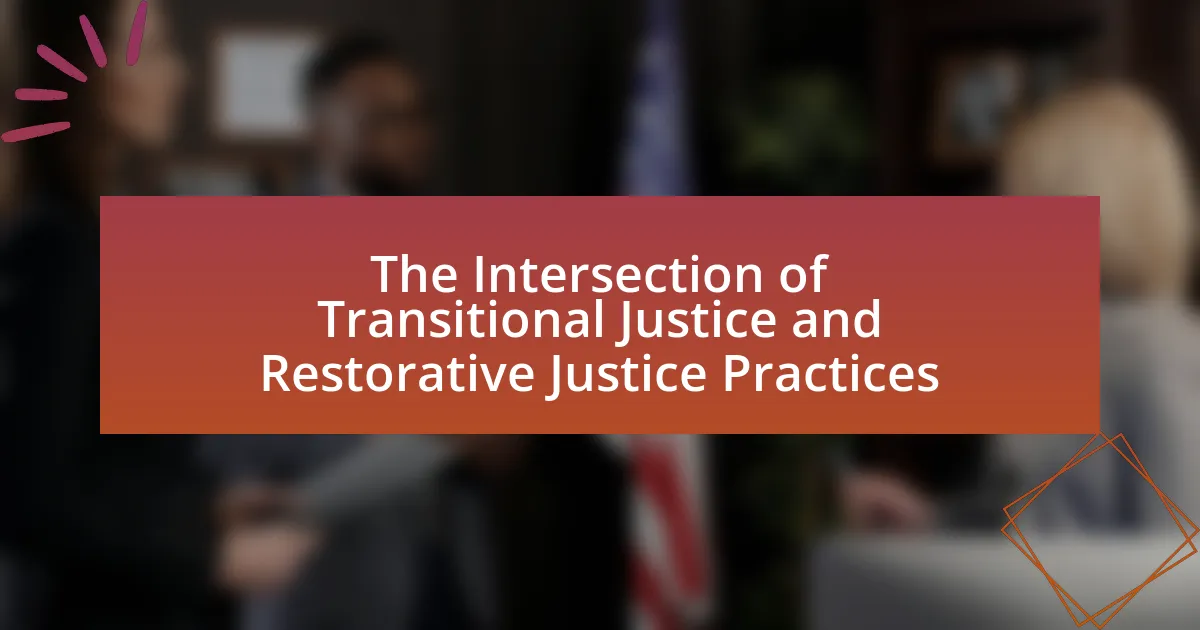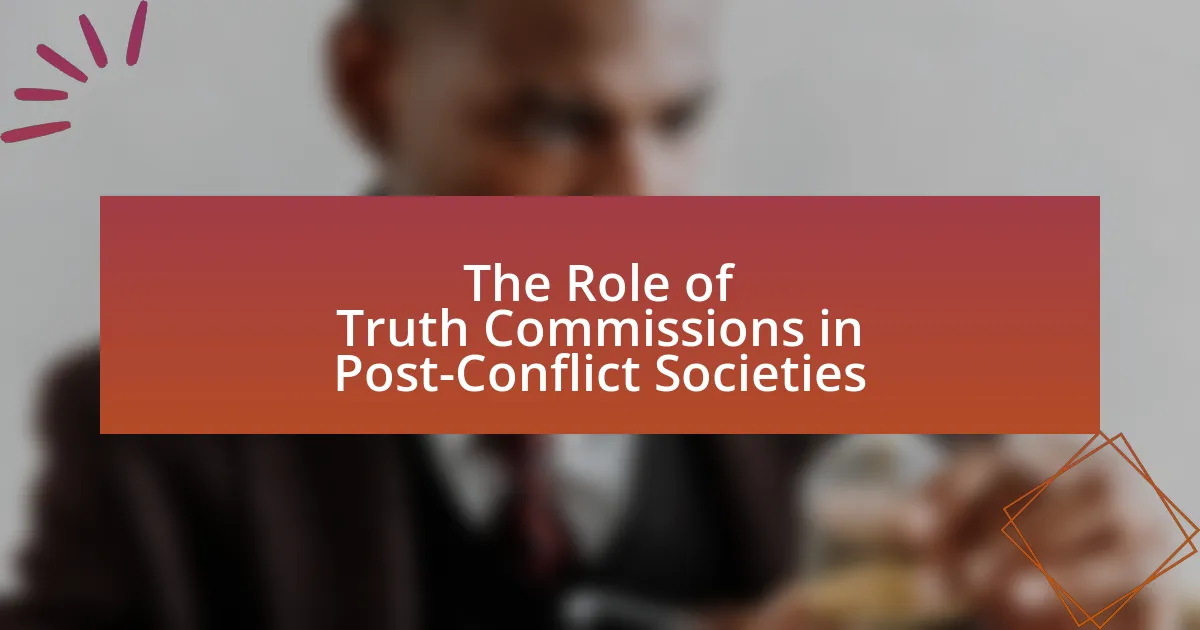The article examines the challenges of implementing truth and reconciliation frameworks in authoritarian regimes, highlighting key obstacles such as lack of political will, suppression of dissent, and fear of retribution among victims. It discusses the resistance of authoritarian governments to these processes, driven by a desire to maintain power and control over historical narratives. The role of state control, societal divisions, and psychological barriers faced by victims and perpetrators are analyzed, along with the influence of external factors and the importance of international support. Case studies from countries like South Africa, Argentina, and Rwanda illustrate these challenges and provide insights into best practices for future reconciliation efforts.
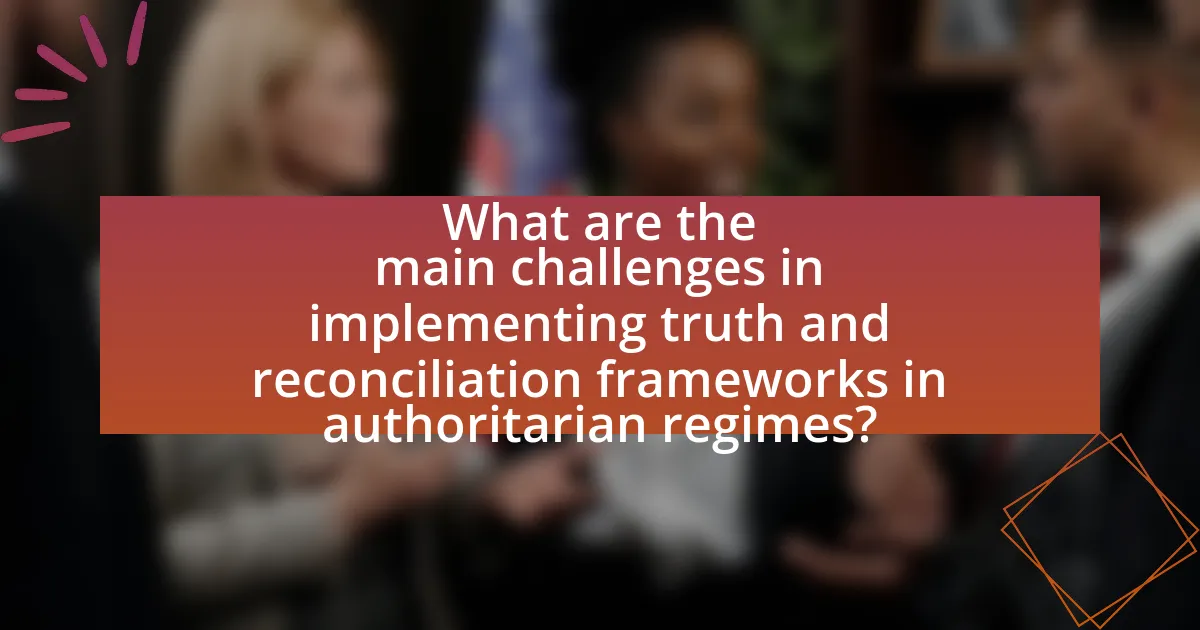
What are the main challenges in implementing truth and reconciliation frameworks in authoritarian regimes?
The main challenges in implementing truth and reconciliation frameworks in authoritarian regimes include lack of political will, suppression of dissent, and fear of retribution among victims. Authoritarian governments often prioritize maintaining power over addressing past injustices, leading to insufficient support for reconciliation efforts. For instance, in countries like Myanmar, the military’s control over the political landscape has hindered meaningful dialogue and accountability for human rights abuses. Additionally, the pervasive climate of fear discourages victims from coming forward, as seen in regimes like North Korea, where speaking out can result in severe consequences. These factors create significant barriers to establishing effective truth and reconciliation processes.
Why do authoritarian regimes resist truth and reconciliation processes?
Authoritarian regimes resist truth and reconciliation processes primarily to maintain their grip on power and control over the narrative. These regimes often fear that such processes could expose human rights abuses, undermine their legitimacy, and incite public dissent. For instance, in countries like Argentina during the military dictatorship, the government actively suppressed truth-telling initiatives to avoid accountability for past atrocities. Additionally, authoritarian leaders may view reconciliation as a threat to their authority, as it could empower opposition groups and foster demands for democratic reforms. The resistance is thus rooted in a desire to protect the regime’s interests and prevent challenges to its dominance.
What role does state control play in hindering these frameworks?
State control significantly hinders the implementation of truth and reconciliation frameworks in authoritarian regimes by limiting freedom of expression and suppressing dissent. In such environments, the government often restricts access to information, undermining transparency and accountability, which are essential for effective reconciliation processes. For instance, in countries like Zimbabwe, state control over media and public discourse has obstructed efforts to address past human rights violations, as the government manipulates narratives to maintain power and avoid scrutiny. This suppression of open dialogue and historical truth directly impedes the frameworks’ goals of fostering healing and justice.
How does fear of retribution affect participation in reconciliation efforts?
Fear of retribution significantly hinders participation in reconciliation efforts, as individuals may avoid engaging due to concerns about potential punishment or backlash from authorities. In authoritarian regimes, where dissent is often met with severe consequences, this fear can lead to a chilling effect, discouraging victims and perpetrators alike from coming forward to share their experiences or seek justice. For instance, research conducted by the International Center for Transitional Justice highlights that in countries with oppressive governments, individuals frequently refrain from participating in truth commissions or public hearings due to the risk of reprisals, thereby undermining the effectiveness of reconciliation processes. This dynamic perpetuates cycles of silence and mistrust, ultimately obstructing the path toward healing and societal cohesion.
What are the societal implications of implementing these frameworks in such contexts?
Implementing truth and reconciliation frameworks in authoritarian regimes can lead to significant societal implications, including the potential for increased social division and conflict. These frameworks often expose historical injustices and human rights violations, which can provoke backlash from those in power and their supporters, leading to heightened tensions within society. For instance, in post-apartheid South Africa, the Truth and Reconciliation Commission revealed deep societal rifts, as different groups reacted variably to the acknowledgment of past atrocities. Furthermore, the implementation process may challenge existing power structures, resulting in resistance from authoritarian leaders who may perceive these frameworks as threats to their authority. This resistance can manifest in repression or violence against advocates for reconciliation, further complicating the societal landscape. Thus, while these frameworks aim to foster healing and unity, their introduction in authoritarian contexts often risks exacerbating existing societal fractures.
How do societal divisions impact the effectiveness of truth and reconciliation initiatives?
Societal divisions significantly hinder the effectiveness of truth and reconciliation initiatives by creating an environment of mistrust and hostility among different groups. When communities are fragmented along ethnic, political, or social lines, the willingness to engage in dialogue and acknowledge past grievances diminishes. For instance, in post-apartheid South Africa, the deep-seated racial divisions complicated the reconciliation process, as many individuals were reluctant to confront the painful truths of their shared history. This reluctance often leads to a lack of participation in reconciliation efforts, undermining their goals and prolonging cycles of violence and resentment. Furthermore, societal divisions can result in competing narratives about the past, making it challenging to establish a common understanding necessary for healing and moving forward.
What psychological barriers exist for victims and perpetrators in authoritarian settings?
Victims and perpetrators in authoritarian settings face significant psychological barriers, including fear of retribution, denial of responsibility, and internalized trauma. Victims often experience heightened anxiety and distrust, which can prevent them from speaking out or seeking justice due to the fear of further victimization or punishment from the regime. Perpetrators may struggle with cognitive dissonance, as they reconcile their actions with their self-image, leading to denial or justification of their behavior. Research indicates that these psychological barriers hinder the processes of truth and reconciliation, as victims may avoid engagement with perpetrators, and perpetrators may resist accountability, perpetuating cycles of violence and impeding societal healing.
What external factors influence the success of truth and reconciliation frameworks?
External factors that influence the success of truth and reconciliation frameworks include international support, political will, and societal engagement. International support, such as funding and diplomatic pressure, can enhance the legitimacy and effectiveness of these frameworks, as seen in South Africa’s post-apartheid transition, where global backing played a crucial role. Political will from governing authorities is essential; without commitment from leadership, initiatives may falter, as evidenced by the limited progress in countries like Myanmar, where the government has shown reluctance to fully embrace reconciliation efforts. Societal engagement, including the involvement of civil society organizations and grassroots movements, is vital for fostering trust and participation, which was evident in the successful community-led initiatives in Rwanda following the genocide.
How do international pressures affect authoritarian regimes’ willingness to engage?
International pressures significantly reduce authoritarian regimes’ willingness to engage in reforms or dialogue. These regimes often respond to external pressures, such as sanctions or diplomatic isolation, by tightening control and resisting engagement to maintain power. For instance, the imposition of economic sanctions on North Korea has led the regime to further isolate itself rather than negotiate, as seen in the aftermath of the 2017 sanctions which intensified its nuclear ambitions instead of prompting dialogue. Additionally, international condemnation of human rights abuses can lead authoritarian leaders to adopt a defensive posture, prioritizing regime survival over engagement, as evidenced by the response of the Syrian government to international calls for accountability during the civil war.
What role do non-governmental organizations play in supporting these frameworks?
Non-governmental organizations (NGOs) play a crucial role in supporting truth and reconciliation frameworks in authoritarian regimes by advocating for human rights, providing documentation of abuses, and facilitating dialogue among affected communities. NGOs often serve as intermediaries, gathering testimonies from victims and survivors, which helps to create a historical record of injustices. For instance, organizations like Human Rights Watch and Amnesty International have documented human rights violations in various authoritarian contexts, providing evidence that can be used to hold perpetrators accountable. Additionally, NGOs often engage in capacity-building efforts, training local communities and leaders on reconciliation processes, which enhances the effectiveness of these frameworks. Their involvement is essential for fostering transparency and accountability, ultimately contributing to the establishment of a more just society.

How do specific case studies illustrate the challenges faced?
Specific case studies illustrate the challenges faced in implementing truth and reconciliation frameworks in authoritarian regimes by highlighting issues such as lack of political will, suppression of dissent, and limited public trust. For instance, the case of South Africa demonstrates that despite a successful transition from apartheid, ongoing political divisions and resistance from certain factions hindered the full realization of reconciliation efforts. Similarly, in the case of Rwanda, the government’s control over narratives and the judiciary has led to accusations of selective justice, undermining the credibility of reconciliation processes. These examples underscore that without genuine commitment from leadership and an environment conducive to open dialogue, truth and reconciliation initiatives often struggle to achieve their intended goals.
What lessons can be learned from past truth and reconciliation efforts in authoritarian regimes?
Past truth and reconciliation efforts in authoritarian regimes demonstrate that genuine political will and public participation are crucial for success. For instance, the South African Truth and Reconciliation Commission (TRC) highlighted the importance of inclusive dialogue, as it allowed victims and perpetrators to share their experiences, fostering national healing. Additionally, the TRC’s reliance on transparency and accountability helped to build trust in the process, showing that without these elements, efforts may lead to further disillusionment among the populace. Historical evidence from countries like Argentina and Chile also illustrates that when regimes fail to acknowledge past atrocities, the reconciliation process often stagnates, leading to ongoing societal divisions. Thus, the lessons emphasize the need for commitment from both the government and civil society to ensure effective truth and reconciliation initiatives in authoritarian contexts.
What were the outcomes of the South African Truth and Reconciliation Commission?
The outcomes of the South African Truth and Reconciliation Commission (TRC) included the establishment of a historical record of human rights violations, the promotion of national unity, and the provision of reparations to victims. The TRC documented over 21,000 human rights violations and facilitated the testimony of approximately 7,000 individuals, which contributed to a collective understanding of the apartheid era’s atrocities. Additionally, the TRC’s recommendations led to the creation of a reparations program that provided financial compensation and support to victims, thereby addressing some of the injustices faced during apartheid. The commission’s work aimed to foster reconciliation and healing in a deeply divided society, although challenges in fully achieving these goals remain evident.
How did the experience in Chile inform future reconciliation efforts in similar contexts?
The experience in Chile significantly informed future reconciliation efforts in similar contexts by demonstrating the importance of establishing a comprehensive truth commission and fostering public dialogue. The Chilean National Commission on Truth and Reconciliation, established in 1990, revealed the extent of human rights violations during the Pinochet regime, which highlighted the necessity of acknowledging past atrocities as a foundation for healing. This model has been referenced in subsequent reconciliation processes in countries like South Africa and Rwanda, where similar frameworks were adapted to address their unique historical contexts. The Chilean experience underscored that transparency, accountability, and victim participation are crucial for successful reconciliation, influencing how other nations approach their own truth and reconciliation initiatives.
What common themes emerge from various case studies?
Common themes that emerge from various case studies on challenges in implementing truth and reconciliation frameworks in authoritarian regimes include the lack of political will, the suppression of dissent, and the manipulation of historical narratives. These themes highlight how authoritarian governments often resist accountability and transparency, undermining efforts for genuine reconciliation. For instance, in countries like Argentina and Chile, the absence of governmental support for truth commissions has hindered the acknowledgment of past human rights abuses, demonstrating the critical role of political commitment in the success of such frameworks. Additionally, the control of media and education by authoritarian regimes often leads to a distorted understanding of history, further complicating reconciliation efforts.
How do political will and leadership impact the success of these frameworks?
Political will and leadership are critical to the success of truth and reconciliation frameworks in authoritarian regimes. Strong political will ensures that leaders prioritize and commit resources to the implementation of these frameworks, which is essential for fostering trust and cooperation among conflicting parties. For instance, in South Africa, Nelson Mandela’s leadership and commitment to reconciliation were pivotal in transitioning from apartheid to a democratic society, demonstrating how effective leadership can facilitate the acceptance and execution of such frameworks. Conversely, a lack of political will can lead to inadequate support, undermining the framework’s objectives, as seen in countries where leaders resist accountability and transparency. Thus, the interplay between political will and leadership directly influences the effectiveness and sustainability of truth and reconciliation efforts in authoritarian contexts.
What role does public perception play in the acceptance of reconciliation processes?
Public perception significantly influences the acceptance of reconciliation processes, as it shapes the legitimacy and credibility of these initiatives. When the public views reconciliation efforts positively, they are more likely to support and engage with the processes, leading to greater chances of success. For instance, in post-apartheid South Africa, the Truth and Reconciliation Commission gained public support due to widespread recognition of the need for healing and justice, which facilitated its acceptance and implementation. Conversely, negative public perception can undermine these processes, as seen in various authoritarian regimes where skepticism about the government’s intentions leads to resistance against reconciliation efforts. Thus, public perception acts as a critical determinant in the effectiveness and sustainability of reconciliation initiatives.

What strategies can be employed to overcome these challenges?
To overcome the challenges in implementing truth and reconciliation frameworks in authoritarian regimes, strategies such as fostering inclusive dialogue, ensuring international support, and promoting civil society engagement can be employed. Fostering inclusive dialogue involves creating platforms for diverse voices, including marginalized groups, to participate in discussions, which can enhance legitimacy and acceptance of the process. Ensuring international support is crucial, as external pressure and resources can help facilitate the implementation of these frameworks, evidenced by cases like South Africa, where international backing played a significant role in the success of its Truth and Reconciliation Commission. Promoting civil society engagement empowers local organizations to take an active role in the reconciliation process, which has been shown to increase community buy-in and sustainability of initiatives, as seen in various post-conflict societies.
How can international actors support truth and reconciliation frameworks in authoritarian regimes?
International actors can support truth and reconciliation frameworks in authoritarian regimes by providing financial resources, technical expertise, and diplomatic pressure. Financial resources can facilitate the establishment and operation of truth commissions, as seen in South Africa, where international funding helped sustain the Truth and Reconciliation Commission. Technical expertise can be offered through training programs for local stakeholders, ensuring they possess the necessary skills to conduct investigations and engage communities effectively. Diplomatic pressure can encourage authoritarian governments to commit to these frameworks, as demonstrated by the international community’s influence in promoting accountability in post-conflict societies like Sierra Leone. These actions collectively enhance the legitimacy and effectiveness of truth and reconciliation processes in challenging political environments.
What types of diplomatic strategies have proven effective in promoting reconciliation?
Effective diplomatic strategies for promoting reconciliation include dialogue facilitation, third-party mediation, and confidence-building measures. Dialogue facilitation encourages open communication between conflicting parties, allowing for the expression of grievances and fostering mutual understanding. Third-party mediation, often involving neutral countries or international organizations, helps to bridge gaps and propose solutions that may not be considered by the parties involved. Confidence-building measures, such as joint projects or cultural exchanges, create a foundation of trust and cooperation, essential for long-term reconciliation. Historical examples, such as the role of the United Nations in mediating peace agreements in post-conflict societies, demonstrate the effectiveness of these strategies in achieving reconciliation.
How can funding and resources be mobilized to support these initiatives?
Funding and resources can be mobilized to support truth and reconciliation initiatives in authoritarian regimes through strategic partnerships with international organizations, government grants, and private sector investments. International organizations, such as the United Nations and various NGOs, often provide financial assistance and technical support for these initiatives, recognizing their importance in promoting peace and stability. For instance, the UN has allocated millions in funding for similar projects in post-conflict countries, demonstrating the viability of external financial support. Additionally, engaging local businesses and philanthropists can create a sustainable funding model, as they may have vested interests in fostering social stability and community development. This multifaceted approach not only secures necessary resources but also enhances the legitimacy and effectiveness of the initiatives by involving a diverse range of stakeholders.
What grassroots approaches can facilitate reconciliation in authoritarian contexts?
Grassroots approaches that can facilitate reconciliation in authoritarian contexts include community dialogue initiatives, truth-telling processes, and local peacebuilding efforts. Community dialogue initiatives create safe spaces for individuals from different backgrounds to share their experiences and grievances, fostering understanding and empathy. Truth-telling processes allow victims to recount their stories, which can validate their experiences and promote collective healing. Local peacebuilding efforts, often led by civil society organizations, mobilize community members to address conflicts and build trust, thereby laying the groundwork for broader reconciliation. Evidence from various case studies, such as the Truth and Reconciliation Commission in South Africa, demonstrates that these grassroots efforts can effectively contribute to healing and social cohesion even in repressive environments.
How can community engagement enhance the effectiveness of truth and reconciliation efforts?
Community engagement enhances the effectiveness of truth and reconciliation efforts by fostering trust and collaboration among affected populations. When communities actively participate in the reconciliation process, they contribute local knowledge and perspectives that are crucial for addressing historical grievances. For instance, in South Africa’s post-apartheid reconciliation, community involvement was essential in creating a more inclusive narrative that acknowledged diverse experiences, leading to greater societal acceptance of the truth commission’s findings. Engaging communities also empowers individuals, encouraging them to take ownership of the reconciliation process, which can lead to more sustainable outcomes. Research indicates that inclusive approaches, such as those seen in the Rwandan reconciliation efforts, significantly improve the likelihood of long-term peace and stability by addressing root causes of conflict through community dialogue and participation.
What role does education play in fostering a culture of reconciliation?
Education plays a crucial role in fostering a culture of reconciliation by promoting understanding, empathy, and critical thinking among individuals from diverse backgrounds. Through curricula that include historical injustices and narratives from multiple perspectives, education helps to dismantle stereotypes and build bridges between communities. For instance, programs that incorporate the history of marginalized groups can lead to increased awareness and acknowledgment of past wrongs, which is essential for healing. Research indicates that educational initiatives aimed at reconciliation, such as those implemented in post-apartheid South Africa, have significantly contributed to social cohesion and reduced tensions among previously divided groups.
What best practices should be considered for future implementations?
Best practices for future implementations of truth and reconciliation frameworks in authoritarian regimes include ensuring local ownership of the process, fostering inclusive dialogue, and prioritizing transparency. Local ownership empowers communities to engage meaningfully, as evidenced by the success of the South African Truth and Reconciliation Commission, which involved extensive participation from various societal sectors. Inclusive dialogue, which incorporates diverse voices, enhances legitimacy and acceptance, as seen in the experiences of countries like Rwanda. Transparency in proceedings builds trust among stakeholders, reducing skepticism and resistance, a principle highlighted in the work of the International Center for Transitional Justice. These practices collectively contribute to more effective and sustainable reconciliation efforts in challenging political environments.
What are the key elements of a successful truth and reconciliation framework?
A successful truth and reconciliation framework includes key elements such as acknowledgment of past injustices, establishment of a truth commission, victim support mechanisms, and a commitment to reparations. Acknowledgment of past injustices is crucial as it validates the experiences of victims and fosters societal healing. Establishing a truth commission allows for the documentation of human rights violations, promoting transparency and accountability. Victim support mechanisms provide necessary psychological and social assistance to those affected, ensuring their voices are heard. Finally, a commitment to reparations demonstrates a tangible recognition of harm and a willingness to address the consequences of past actions, which is essential for rebuilding trust in society. These elements are supported by successful case studies, such as South Africa’s Truth and Reconciliation Commission, which highlighted the importance of these components in achieving lasting peace and reconciliation.
How can lessons from previous efforts inform future strategies?
Lessons from previous efforts can inform future strategies by providing insights into the effectiveness and shortcomings of past truth and reconciliation frameworks in authoritarian regimes. Analyzing historical cases, such as South Africa’s Truth and Reconciliation Commission, reveals that inclusive participation and transparency are crucial for legitimacy and public trust. Additionally, studies indicate that addressing victims’ needs and ensuring accountability can enhance the likelihood of successful implementation. For instance, the failure of the Guatemalan Commission for Historical Clarification to hold perpetrators accountable led to ongoing societal divisions, highlighting the necessity of integrating justice mechanisms into future strategies.
